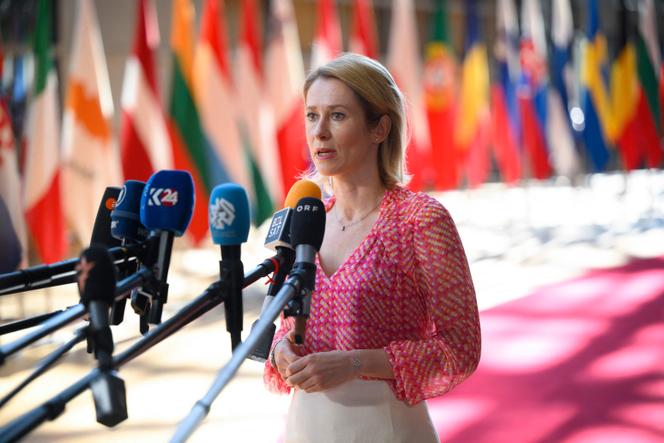


The European Union on Tuesday, May 20, agreed to review its cooperation deal with Israel over alleged human rights abuses in Gaza, the bloc's top diplomat Kaja Kallas said. Kallas said Brussels was acting after "a strong majority" of its 27 member states backed the move, in a meeting of EU foreign ministers, in a bid to pressure Israel. Momentum to re-examine the EU-Israel Association Agreement, which forms the basis for trade ties between the two sides, has grown since Israel restarted its offensive in Gaza after a ceasefire expired.
"What it tells is that the countries see that the situation in Gaza is untenable, and what we want is to really help the people, and what we want is to unblock the humanitarian aid so that it will reach the people," Kallas told journalists. Kallas further said the aid trucks Israel allowed into Gaza on Tuesday was a "drop in the ocean" compared to suffering faced by the people inside the strip. Israel said that 93 aid trucks entered the territory on Tuesday.
The Netherlands spearheaded the latest push over a year after two staunch backers of the Palestinian cause, Spain and Ireland, failed to convince the bloc to suspend the accord. Diplomats said 17 EU states pressed for review at the Brussels meeting under Article two of the agreement that calls for respect for human rights. Belgium's foreign minister, Maxime Prevot, said he had "no doubt" about the violation of rights in Gaza, and the review could lead to the suspension of the entire deal.
The announcement comes the same day as the British government ramped up its criticism of Israel's military offensive in Gaza by suspending free trade talks and hitting West Bank settlers with sanctions. The moves came as international pressure mounts on Israel following a nearly three-month blockade of supplies into Gaza that led to famine warnings. Even the United States, a staunch ally of Israel, has voiced concerns over the growing hunger crisis.
Israel said in response that external pressure will not change its course: "If, due to anti-Israel obsession and domestic political considerations, the British government is willing to harm the British economy – that is its own prerogative," Israeli foreign ministry spokesman Oren Marmorstein said in a statement. "External pressure will not divert Israel from its path in defending its existence and security against enemies who seek its destruction."
Foreign Secretary David Lammy described the situation in Gaza as abominable and said that while an existing trade agreement was in place, the government couldn't continue discussions with an Israeli government pursuing what he called egregious policies in the West Bank and Gaza. "The world is judging," Lammy said. "History will judge them. Blocking aid. Expanding the war. Dismissing the concerns of your friends and partners. This is indefensible. And it must stop."
Israel's ambassador to the UK, Tzipi Hotovely, was also summoned to the Foreign Office on Tuesday, where Middle East minister Hamish Falconer planned to call the 11-week blockade of aid to Gaza "cruel and indefensible."
Lammy announced that in addition to previous sanctions imposed by the UK, it was now imposing sanctions on a further "three individuals, two illegal settler outposts and two organizations supporting violence against Palestinian community." He said the illegal Israeli settlements were spreading across the West Bank "with the explicit support of this Israeli government."
The announcement came after British Prime Minister Keir Starmer ramped up his criticism of Israel on Tuesday, saying the level of suffering by children in Gaza was "utterly intolerable" and repeated his call for a ceasefire. "I want to put on record today that we're horrified by the escalation from Israel," Starmer told the UK's Parliament.
His brief remarks followed a scathing joint condemnation he issued Monday with French President Emmanuel Macron and Canadian Prime Minister Mark Carney that marked one of the most significant criticisms by close allies of Israel's handling of the war in Gaza and its actions in the West Bank.
The three leaders threatened to take "concrete actions" if the government of Israeli Prime Minister Benjamin Netanyahu did not cease its renewed military offensive and significantly lift restrictions on humanitarian aid. Netanyahu said the statement was "a huge prize" for Hamas.
